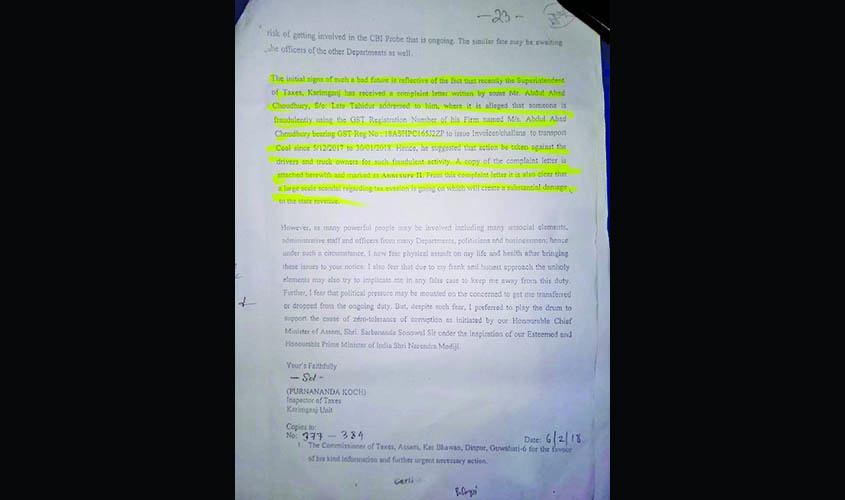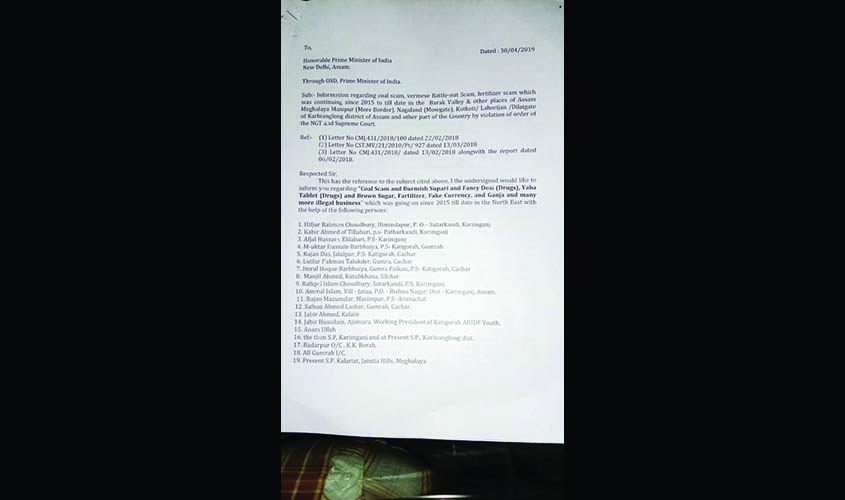New Delhi: Irregularities in mining and transportation of coal by vendors and other stakeholders, with the help of some government officers, in Assam and Meghalaya have come to light. Two government reports accessed by The Sunday Guardian suggest that these vendors are extracting and transporting mined coal by using dubious Goods and Services Tax (GST) bills, transport passes (TP) and invoices.
The Supreme Court lifted the ban on coal mining in Meghalaya with certain regulations in an order dated 3 July 2019. However, a letter to Prime Minister Narendra Modi has claimed that illegal transportation of coal, even during the ban on mining, has caused a revenue loss of an estimated Rs 500 crore to the Central government since 2017. According to that letter, paper documents such as TP and GST have been duplicated at Margherita, Umrangshu and Dima Hasao in Assam, as well as in Meghalaya. The letter has alleged that with the help of some government officers, this syndicate has supplied around two lakh trucks of coal from Meghalaya to Bangladesh and other parts of Northeast by manipulating GST, TP and Central government invoices. Sources said that as an impact of the letter to the PMO, the Chief Minister’s Secretariat in Assam has sent the letter to the Home Department. The Governor’s office in Assam too has sent the same letter to the Director General of Police for needed action.
Earlier, the Supreme Court had banned the mining of coal in Meghalaya in 2014 for various reasons, including casualties associated with the system of rat-hole mining and air/water and soil pollution. After the ban on mining on coal, as per the appeal by landowners and coal dealers/transporters, relief was granted by the Supreme Court on 22 September 2016 to dispose of and transport the already mined coal, which was stocked in various places in Meghalaya, within eight months, starting from 1 October 2016. The SC also ordered that such transportation would happen as per the National Green Tribunal (NGT) guidelines. Consequently, transporters have to pay royalty and contribute to the Meghalaya Environmental Protection and Restoration Fund (NEPRRF). However, this period had to be extended as 8 lakh metric tonnes of coal were still lying in various places of the state.

“Since the extension of time period for disposing of the extracted coal, a group has been running a huge operation to deprive the Government of revenue and also to go around the ban imposed by the NGT and upheld by the Supreme Court,” says a report dated 6 February 2018 by Inspector of Taxes, Karimganj unit, to Deputy Commissioner of Taxes, Silchar. The report, which has been accessed by The Sunday Guardian, also highlights how some landowners, dealers/transporters are still mining coal illegally and selling them to places outside Meghalaya and to Assam by issuing illegal invoices. It states that vehicles that carry mineral transport challan along with invoices are the ones that had paid the royalty and other fees as required under the NGT order and all other transportation of coal is questionable as per the law of land. “Any such extra vehicles mean loss of revenue in royalty to the Government of Meghalaya. Further, the locus-standi of such dealers raising invoices dubiously is not tenable and realisation of GST is a far cry,” the report reads.

The letter of Inspector of Taxes was communicated to the Commissioner of Taxes of Assam government, in a letter dated 13 February 2018, by Deputy Commissioner of Silchar. On 22 February the same year, another letter was written by the DC of Silchar to Commissioner of Taxes in Guwahati regarding the anomalies in the coal business. “The Joint Verification Team is also finding great difficulty in ascertaining the originality of challans, specially the signatures of Mines and Royalty inspectors engaged by the Government of Meghalaya for this purpose,” it reads. A Joint Verification Team comprising the Executive Magistrate, Senior Police Officer, District Transport Officer and his representative and Assistant Commissioner of Taxes and his representative was formed after an instruction from the office of the Commissioner of Transport, Assam, to check illegal transportation of coal from Meghalaya. The letter also states that though the penalty against overloading of vehicles has been realised, the penalty against violation of GST and taxes on extra load is yet to be realised.
The letter to the PMO has alleged that despite all these communications to the Commissioner of Taxes in Guwahati for appropriate instruction, no action has been taken so far. The Sunday Guardian tried to contact the Commissioner of Taxes in Guwahati, but no response was received until the time of writing this report.
According to sources, trucks carrying coal may be violating transport rules by carrying 33-40 tonnes, which is more than the allowed nine tonnes per truck. Around 300 such trucks from Cachar district of Assam supply coal to Tripura every day. There are also allegations that police officials, too, receive Rs 50,000-Rs 60,000 from each of these trucks. In Upper Assam hundreds of such trucks carrying illegal coal have been transported to different parts of the country from hundreds of such illegal rat hole coal mines and 11 forest reserves and inside the Dihing Patkai Wildlife Sanctuary.
Speaking to The Sunday Guardian, Congress’ MP from Nagaon constituency, Pradyut Bordoloi, who was a minister in the previous Congress government, said, “Organised mining of coal started in Tinisukia district of Upper Assam in 1881. But earlier coal was extracted from underground coal mines. Now, for the last three years, a coal cartel has formed. Their modus operandi is like this: these coal cartels apply to the industry department saying that they are putting up coal processing units called ‘Coke-Coal Oven unit’. They put up these units. These units are the hubs of coal illegal coal mining and illegal coal collection.” He also alleged that coke coal oven units ostensibly to produce “coke” from raw coal to be obtained from Coal India through e-auction have sprung up all over the place, including inside reserved forests and wildlife sanctuaries. “These coke units fortified by at least 15 feet high walls all around are the nerve centres of the entire illegal coal mining, trade and transportation. Instead of ‘coke’ production, they send out tens of dozens of trucks/trailers laden with ‘raw coal’ every day with fake documents,” Bordoloi said.
These “coke unit owners” engage hundreds of coal diggers through “rat hole mining” and pay huge amounts of money to the police and government officers. According to Bordoloi, there are around 5,000 such rat-hole mining inside 11 reserve forests and the Dihing Patkai Wildlife Sanctuary. The extracted coal from rat hole mines is brought to these so-called coke-coal oven units. Then, at night, this extracted coal is transported out of these units in big trucks with presumed GST, Coal India challans. He further alleged that a nexus has been formed by the Industry Department, Pollution Control, Forest Department and the police. This is the reason why the Central government is losing hundreds of crores in revenue on a monthly basis.
When asked, Assam BJP spokesperson Aparajita Bhuyan said, “All these syndicates have been running in the state since Congress rule. No one can say these started from 2018. Our government is totally committed to stop all these syndicates and scams running in the state. Congress has ruled the country as well as Assam for more than 60 years. Our BJP government has zero tolerance policy towards any such corrupt activity. But it takes time to change these corrupt practices which have been running for the last 60 years.”
She also alleged that not only coal, during Congress rule in the state, there were syndicates in everything, from egg to betel leaf. “So Congress doesn’t have any moral right to question us on these issues. It is good that Pradyut Bordoloi, being a new MP, is raising these issues. But one should also ask him what he did to stop coal syndicate as a powerful minister representing Margherita Assembly constituency in the previous Congress government in the state,” she added. Margherita is the epicentre of coal business in Assam.
Though the CID has been investigating the illegal coal transportation and anomalies in this business, it has not been able to bring all these syndicates and coal mafias under the ambit of its investigation yet. Officials say that they are confident that action will follow in the light of Prime Minister Narendra Modi’s zero tolerance policy towards actions that are not sanctified by law.
On Friday, in Parliament, Pradyut Bordoloi asked a question to Minister of Environment, Forest and Climate Change on whether the government was aware that 17 reserved forests and one wildlife sanctuary in Tinsukia district of Upper Assam had been plundered by an organised coal mafia, which had cleared the rain forest and was practising “rat hole coal mining” indiscriminately. In reply, Minister of State Babul Supriyo accepted the fact that illegal coal mining in the form of rat hole mining was taking place since long in some of the Reserved Forests (RFs) and Proposed Reserved Forest (PRFs) in Digboi division of Tinsukia district. “This situation (was) aggravated by many factors such as extremely difficult terrain, inter-state border issues and hostile nature of offenders,” the minister said. He also said that to prevent illegal mining, the Assam Forest Department was taking various measures such as deployment of armed personnel of the Assam Forest Protection Force in the affected forest divisions, making use of GPS to assess the damage caused by illegal mining, monitoring and assessing the extent of illegalities with the use satellite imagery, along with taking coordinated efforts involving the police and civil administration.

